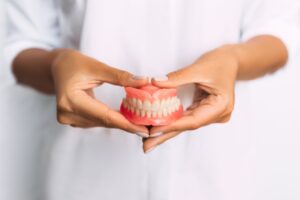Dentures are the tried-and-true method for rebuilding your grin after tooth loss because they allow you to speak and eat more easily. They are customized to fit like a glove over your gums and rely on a tight suction to stay in place. If you’ve noticed that your lower dentures keep coming loose, however, you’re not alone! The ones fitted to your bottom arch are notorious for becoming dislodged. Keep reading to learn 4 reasons why and what you can do about it!
Issue #1: A Flat Ridge
Did you know that your jawbone begins to deteriorate when you lose teeth? This is because your body recognizes that the added support is no longer needed to support your pearly whites, so it reabsorbs some of your bone mass. Over time, your bone structure can become too flat to provide an adequate hold for your restoration. In some cases, your dentist might be able to sufficiently bulk it up with a bone graft. Otherwise, they might recommend an alternative solution like implant dentures that are permanently installed.
Issue #2: Insufficient Bond
As your facial bone structure continues to fade, your dentures won’t be able to form the same tight bond against your gums as they used to. The borders (or sides) of your restoration need to be the correct length to create a sufficient seal. The dimensions of your mouth continue to shift naturally while your restoration doesn’t. Fortunately, this can often be remedied with an appropriate adhesive. There are creams, powders, and strips that can fill in the gaps and create an all-day seal that helps keep it in place. If that’s not sufficient, you may need to contact your dentist about relining or replacing your dentures.
Issue #3: Warped Base
It’s important to care for your dentures properly to keep them in good shape because otherwise they could become damaged or disfigured. For example, if you leave them out to dry at night instead of soaking them, the base (the gum-colored portion) can become distorted. It can crack or bend and will not longer rest on your ridges the way it should. If yours are damaged, contact your dentist to repair them. Don’t use super glue or other household materials to try to mend them as this can be toxic to your health.
Issue #4: Muscle Control
It takes time and patience to adjust to wearing your dentures. You’ll find that you must adapt to speaking and eating with them in place, which requires the use of new muscles in your mouth and face. The lower set can be particularly troublesome because they’re the closest to your tongue. Try to be patient with yourself as you learn how to hold them in your mouth while simultaneously conversing or chewing. Eventually, it’ll become second nature, and you won’t have anything to worry about.
If you continue to have problems with your dentures coming loose, contact your dentist and they can work with you to identify what’s happening and suggest appropriate solutions.
About the Author
Dr. Peter A. Pate has over 40 years of experience helping patients enhance the quality of their lives by improving their oral health. He graduated from the University of Tennessee School of Dentistry and has since completed numerous ongoing educational courses with the American Dental Association, the Academy of General Dentistry, and the Pankey Institute. Today, he takes pride in providing a full array of services, including dentures, in a comfortable and eco-friendly environment. If your dentures are slipping and you’d like an appointment, you’re welcome to request one on the website or by calling (404) 266-9424.

